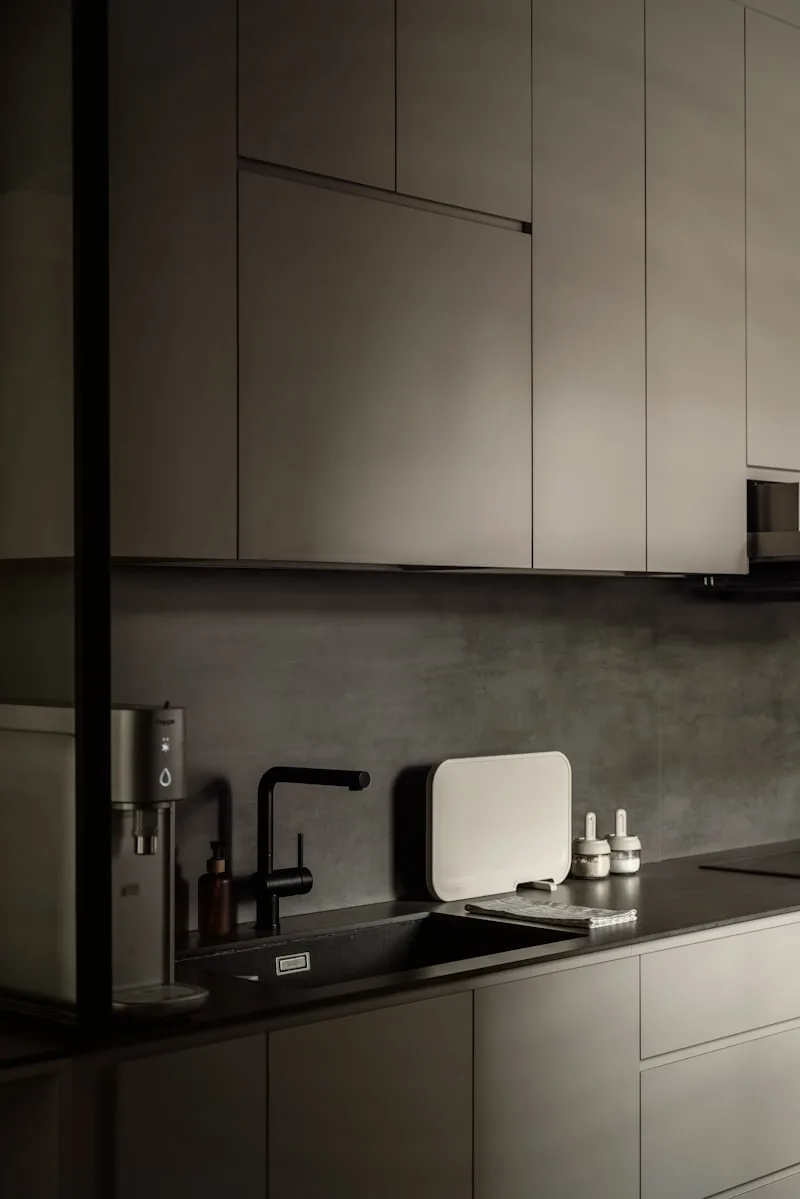Now, let’s talk about how to fix it. First off, don’t panic! This is a common issue, and with a few simple steps, you can have those doors looking sharp again. Start by checking the hinges. Sometimes, a quick adjustment is all it takes. Loosen the screws slightly, reposition the door, and then tighten them back up. It’s like giving your cabinets a little hug to bring them back together!

If that doesn’t do the trick, you might need to consider replacing the hinges altogether. Think of it as upgrading from a flip phone to a smartphone—sometimes, you just need a fresh start! When shopping for new hinges, look for adjustable ones that allow for fine-tuning. This way, you can easily align your doors just right.
Lastly, if the gap is still there, you might want to explore adding a shim. A shim is like a tiny superhero for your cabinets, filling in those gaps and providing extra support. Just slide it in where needed, and voilà! Your kitchen will look more polished, and you’ll feel like a DIY champion. So, roll up your sleeves and get ready to tackle that gap—it’s easier than you think!
The Gap Dilemma: Understanding the Space Between Your Kitchen Cabinet Doors
First off, that gap isn’t just there for decoration. It serves a purpose! Think of it as the breathing room for your cabinets. Just like we need space to stretch our legs after a long day, your cabinets need a little wiggle room to function properly. This gap allows for expansion and contraction due to temperature changes, preventing warping and ensuring your doors open and close smoothly.
But here’s the kicker: that gap can also be a design dilemma. It can make your kitchen look unfinished or even a bit shabby. Imagine a beautiful, sleek kitchen with shiny new cabinets, only to be interrupted by those pesky gaps. It’s like wearing a stunning outfit but forgetting to iron it—definitely a mood killer!
So, what can you do about it? One option is to embrace the gap and use it creatively. Think about adding decorative fillers or molding to bridge the space. It’s like accessorizing an outfit; a little flair can go a long way! Alternatively, if you’re feeling adventurous, you could consider custom cabinetry that fits your space perfectly, eliminating the gap altogether.
Cabinet Door Gaps: Causes, Consequences, and Clever Fixes
One common culprit is humidity. Think of your cabinets as sponges; they expand and contract with changes in moisture. If your kitchen is prone to humidity, those gaps can widen, making your cabinets look like they’re in a perpetual state of disarray. Another reason could be poor installation. If the cabinets weren’t leveled properly, it’s like trying to balance a seesaw on a hill—one side will always be higher than the other, leading to those annoying gaps.
Now, let’s talk consequences. Those gaps aren’t just a cosmetic issue; they can invite dust, pests, and even moisture into your cabinets. Imagine a tiny critter making a cozy home in that gap—yikes! Plus, if you’re a neat freak, those gaps can drive you up the wall, making your kitchen feel less inviting.
But don’t worry! There are clever fixes to save the day. One simple solution is to adjust the hinges. Most cabinet doors have adjustable hinges that can help you align them better. It’s like giving your cabinets a little makeover! If that doesn’t do the trick, consider using a thin strip of wood or a filler to bridge the gap. It’s a quick fix that can make a world of difference.
Is Your Kitchen Cabinetry Out of Sync? Here’s Why Those Gaps Matter
First off, those gaps can be more than just an eyesore. They can lead to a whole host of problems, from dust and debris collecting in hard-to-reach places to potential pest invasions. Think about it: a tiny gap might seem harmless, but it’s like leaving the front door ajar. You wouldn’t do that, right?
Moreover, gaps can affect your kitchen’s functionality. If your cabinets aren’t aligned properly, it can make accessing your favorite pots and pans a real hassle. It’s like trying to find a needle in a haystack! You want your kitchen to be a space where you can whip up a meal without frustration, not a maze of misaligned cabinetry.
And let’s not forget about aesthetics. A kitchen with gaps can feel disjointed, like a puzzle with missing pieces. You want your space to look polished and inviting, not like it’s been through a renovation gone wrong.
From Frustration to Fix: How to Eliminate Space Between Kitchen Cabinet Doors
First off, let’s talk about why those gaps happen in the first place. Over time, your cabinet doors can shift due to humidity, temperature changes, or just plain wear and tear. It’s like your cabinets are trying to tell you they need a little TLC! But instead of letting that gap drive you nuts, let’s dive into some simple solutions.
One of the easiest fixes is to adjust the hinges. Most cabinet doors have adjustable hinges that allow you to tweak their position. Just grab a screwdriver and start turning those screws. It’s like giving your cabinets a mini makeover! A little twist here and there can bring those doors back together, eliminating that pesky space.

If adjusting the hinges doesn’t do the trick, consider adding a shim. Think of it as a tiny cushion for your cabinet door. You can slide a thin piece of wood or cardboard behind the hinge to lift the door slightly. It’s a quick and effective way to close that gap without breaking a sweat.
And if you’re feeling a bit more adventurous, you might want to replace the hinges altogether. New hinges can provide a fresh start, ensuring your doors align perfectly. It’s like upgrading from a flip phone to the latest smartphone—suddenly, everything works better!
So, whether you’re a DIY novice or a seasoned pro, tackling that space between your kitchen cabinet doors is totally doable. With a few simple adjustments, you can transform your kitchen from a source of frustration to a space that feels just right.
Frequently Asked Questions
How Much Space is Normal Between Cabinet Doors?
The ideal gap between cabinet doors typically ranges from 1/8 inch to 1/4 inch. This spacing ensures that doors can open and close smoothly without rubbing against each other, while also providing a visually appealing alignment.
Can I Adjust the Space Between My Cabinet Doors?
Yes, you can adjust the space between cabinet doors. Most cabinet doors have adjustable hinges that allow you to modify the alignment and spacing. By loosening the screws on the hinges, you can shift the doors closer together or further apart, ensuring a uniform appearance and proper functionality.
What Causes Space Between Kitchen Cabinet Doors?
Gaps between kitchen cabinet doors can occur due to several factors, including improper installation, settling of the house, humidity changes causing wood expansion or contraction, and wear over time. Ensuring precise alignment during installation and regular maintenance can help minimize these issues.
What Tools Do I Need to Fix Cabinet Door Gaps?
To fix cabinet door gaps, you will need a few essential tools: a screwdriver for adjusting hinges, a level to ensure doors are aligned, wood shims for spacing, a measuring tape for accurate measurements, and wood filler or caulk for sealing gaps. Having these tools will help you effectively address and resolve any gaps in your cabinet doors.
How Can I Prevent Future Gaps Between Cabinet Doors?
To prevent future gaps between cabinet doors, ensure proper alignment during installation, regularly check and adjust hinges for tightness, and use shims if necessary. Additionally, maintain consistent humidity levels in your home to minimize wood expansion and contraction.
